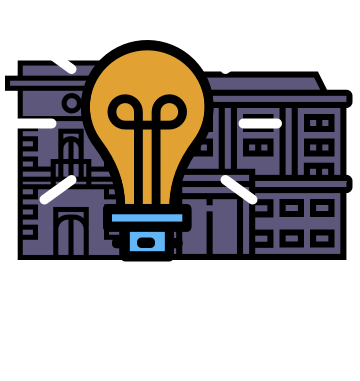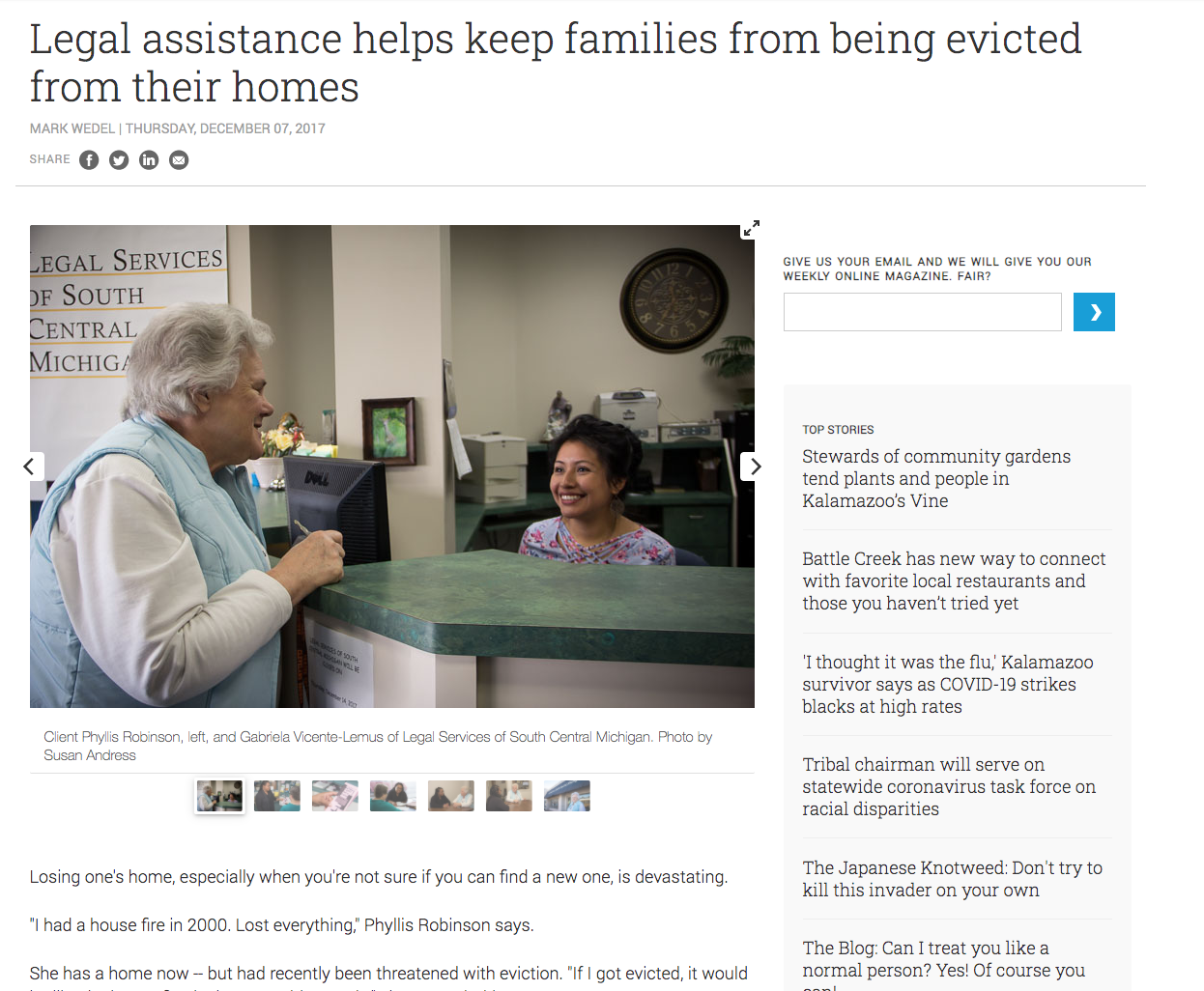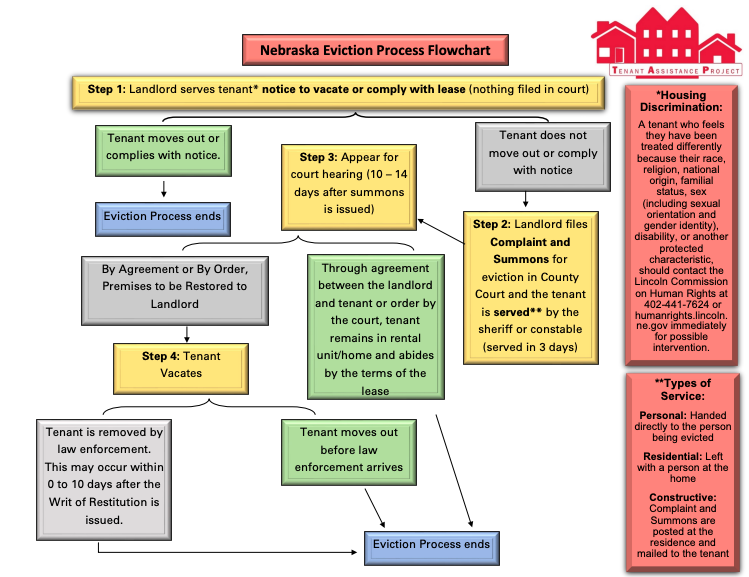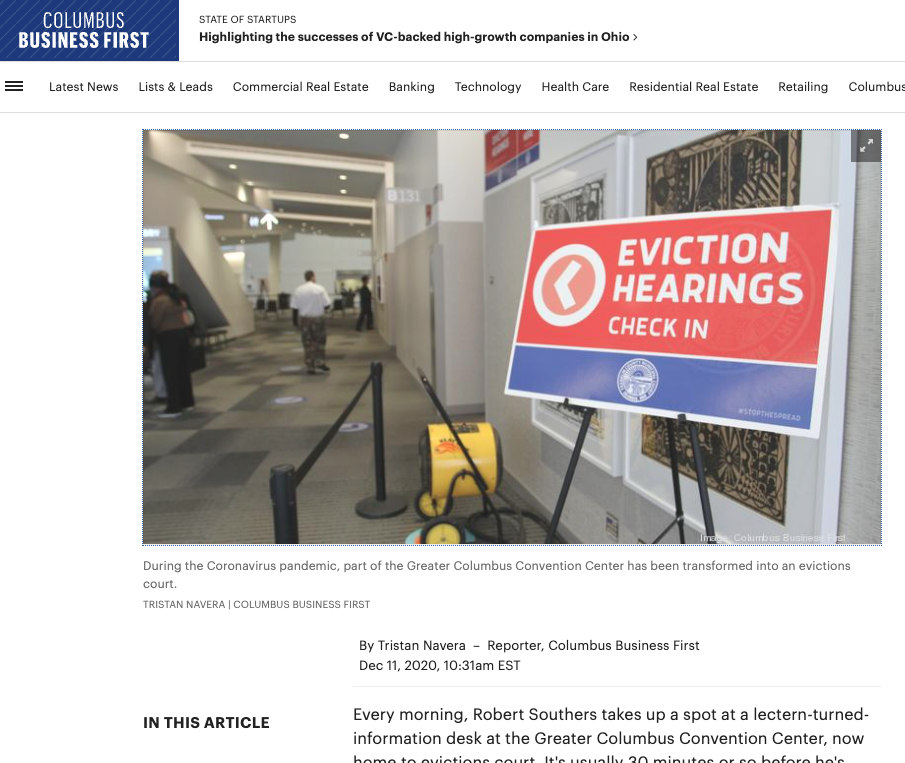Basic Information
Program Name
Jackson County, Michigan Eviction Diversion Program
Short Description
Jackson County’s Eviction Diversion Program (EDP) provides tenants with the opportunity to enter into a facilitated alternative to traditional housing court. They do not need their landlord’s consent to opt into the EDP. On the day of their court case, tenants & landlords have access to mediation services (including negotiating payment installments for back rent, discussing repair issues, and negotiating a move-out date), a legal services consultation, and an eligibility assessment to discern whether or not they meet emergency service requirements.
Location
Jackson County, MI
Duration
The EDP’s trial period began in April 2014 and ended in October 2014. The EDP has continued on since then.
Funding
The total annual cost for the program is approximately $65,000, which includes in-kind donations of volunteer mediator time.
Size (number of beneficiaries)
In 2019, of the roughly 3100 landlord/tenant cases, around 480 tenants were scheduled for mediation. The number of cases in the EDP is capped by the 12th District Court due to resource limitations.
Stakeholders
Who designed and set up the program?
Marc Stanley from Southeastern Dispute Resolution Services and Erica Zimny from Legal Services of South Central Michigan set up the program. This idea stemmed from an ongoing conversation about how to maximize their efficiency and impact. They began by assessing community needs and identified the leverage point they most wanted to focus on: the tenant/landlord relationship. They then did research on other EDPs (Kalamazoo, MI, Lansing, MI & Mason, MI) to develop a set of best practices. After completing their research, Marc and Erica proposed this program to Judge Daryl Mazur, and he agreed to a trial EDP. Throughout the trial period, they had regular meetings to discuss its efficacy.
Who runs and manages the program?
This program is a partnership between Southeastern Dispute Resolution Services and Legal Services of South Central Michigan, with collaboration by and participation from Michigan Department of Health and Human Services and Community Action Agency. Previously, a veteran’s advocate and a representative from Recovery Technology, an outpatient mental health provider, also participated in the program.
Who funds the program?
The EDP is funded by a blend of each agency’s general funding and a grant from the Jackson County United Way.
Intended Beneficiaries: Who does the program target?
This program targets tenants & landlords, but primarily focuses on tenants.
Program Details
How does the program work? What are the typical paths of action that the beneficiary + the service-provider take?
- When the tenant files their answer to the eviction Complaint, they are able to check a box requesting mediation.
- If the tenant checks the box, on the day of their court date, they have access to mediation services (including negotiating payment installments for back rent, discussing repair issues, and negotiating a move-out date), a legal services consultation, and an eligibility assessment to discern whether or not they meet emergency service requirements.
- Parties attend mediation at court prior to their case being heard by a Judge. The parties will often come to an agreement, which typically is a conditional dismissal order that will entirely dismiss the court case if both parties comply with their agreed settlement. In some cases the parties agree to a consent judgment that settles the dispute but provides the landlord with a judgment against the tenant. If the parties do not reach an agreement in mediation, their case is heard by the Court, in the same manner as cases that were not included in the EDP. The Court may decide their case the same day as mediation, or may adjourn the case for a hearing at a later date. In such circumstances, the Court will hold a trial at which the parties may testify and evidence may be presented. The Court will decide whether the tenant can be evicted and whether any money is owed to the landlord. Attorneys from Legal Services of South Central Michigan often represent tenants in Court if their case is not settled in mediation. Some cases that did not settle in mediation are settled later when attorneys from Legal Services of South Central Michigan negotiate directly with the landlord or their attorney on the tenant’s behalf.
- After the EDP, tenants are able to consult with local social service agencies. The agencies can help them meet any remaining financial obligations and/or provide relocation assistance.
What assets can be shared for others to use?
Currently, none — but reach out for more information.
Evidence Base
What are the plans for monitoring and evaluation?
Southeastern Dispute Resolution Services and Legal Services of South Central Michigan informally monitor and review program results on an ongoing basis. These results are reported to program funders such as the Jackson County United Way on a regular basis. Minor revisions to the program are made periodically in consultation with the Court.
Have any evaluations been conducted so far?
During the trial EDP, the court was adequately assured that the program helped ease docket levels and did not interfere with regular court related duties. The Legal Services of South Central Michigan and the Southeastern Dispute Resolution Services continually look at the effectiveness and quality of the program. They hold regular reviews of the mediators, participant check-ins, communication needs, and shared responsibilities.
Contact and Follow-Up Info
Program Website
Documentation + Links
LegalNews.com article from November 2014 on the program
Second Wave Southwest Michigan article from December 2017 on the program
Jackson County United Way page on the program
Point of Contact for more information
Michael Derby, mrderby@lsscm.org
Marc Stanley, mediation@sedrs.org



